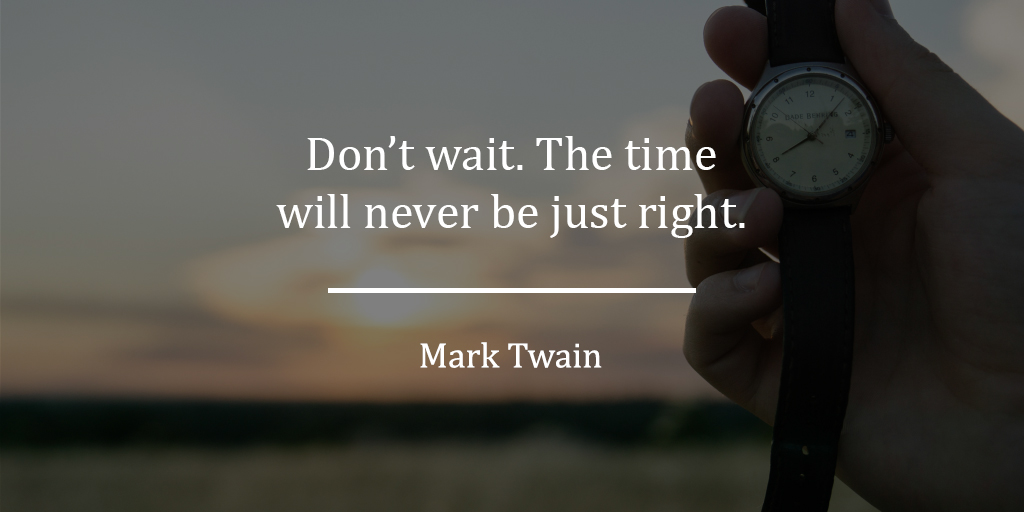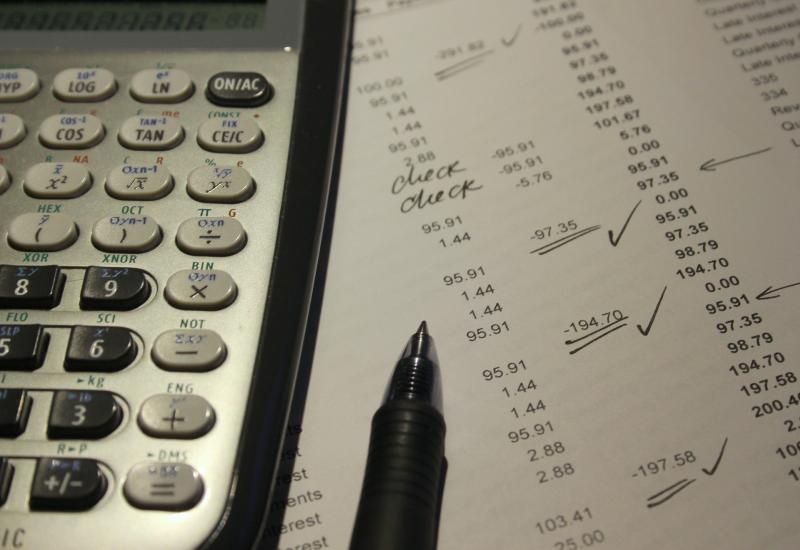When is the right time to buy a home? It’s one of the most common questions we hear in real estate so we thought we’d have a go at answering it, to assist you in your buying decisions.
Let’s start by looking at what you mean by the right time. Are you asking whether the market is in the right place or if it is the right time for you, personally? Often the two can be connected but it’s worth looking at them separately because one consideration may be more important than the other depending on what type of buyer you are.
Is this a good time to buy based on the market conditions?

Mark Twain probably wasn’t was thinking of real estate when he came up with that quote but it fits the situation quite well. If you wait for market conditions to be “perfect”, you’ll wait forever. No matter when you buy a property, there will always be a time, at some point in the future or past, when it will have been more or less advantageous to buy. No one knows where the peaks or troughs are until they have already passed. Anyone who claims they know beforehand should be treated with some healthy skepticism. The factors that affect the real estate market can be as real and practical as interest rates, stock markets and immigration, to factors as ephemeral as market optimism, and consumer confidence.
There are times when the market might be more advantageous for buyers than sellers, of course. If there is lots of inventory and listings are growing at a faster rate than sales, you are probably in a “buyer’s market” which is more favourable to the people on the buying side of the transaction. In a buyer’s market, you will likely have more choice for properties and less competition, but that doesn’t necessarily mean it is the best time to buy. For example, Toronto was a seller’s market at the start of 2015 but people who bought at that time have seen their property values increase by 76% on average since then and will likely feel they made a good choice.
So, how do you know if is the right time to get into the market? If you’re buying a property with a view to holding it long term, then ask yourself one question: can you afford the kind of property that you want to buy? If you can, then the market conditions are good for you.
History and a mountain of statistics from around the world show that real estate inevitably goes up in value over the long term. There will be periods when it doesn’t and the press will abound with reports that the real estate sky is falling. However, real estate works in cycles and inevitably rebounds, so it’s a fair assumption that it will grow in value over the long term.
Of course, this question becomes a bit more complicated if you’re looking to buy as an investment; either by becoming a landlord or by selling on quickly at a profit. If that is your goal then there are far more details you need to focus on and that is best left for another article.
Is it the right time for me?
This is the more complicated question. When is the right time for you to buy a home?
The first thing to look at is connected to the overall market conditions and is mentioned above: can you afford it? When answering this question, don’t forget to look at the whole picture. The most obvious cost is the monthly mortgage payment but there are additional regular costs such as property tax, utilities, property insurance, fees if it is a condominium or common element property, and money that you need to put aside for maintenance and repairs.
Calculate the overall cost of the property, how much you have to pay for your existing debts and obligations, and work out if it all fits within your monthly budget. If it does not you should stop looking and focus on saving up a larger down payment, which will help to reduce your monthly costs. Otherwise, you can begin to focus on other areas.

Do you have a big enough down-payment?
The larger your down-payment, the more affordable your property will be. In Canada, mandatory mortgage insurance is added for all properties purchased with a down-payment of less than 20% of the purchase price. That can drastically affect the monthly cost of your home. That’s not all; a larger down-payment means a smaller mortgage and a better chance that you can pay it off sooner – saving you interest in the long term.
Home-Work
Is your work situation stable? In other words, is your income dependable for the foreseeable future and are you likely to be working in the same place for the next few years? If a change in employment is likely in the near future, you may want to hold off on making such a large financial commitment until you are confident that you can meet your obligations. Similarly, if your work location is likely to change to somewhere farther than a commutable distance from the home you want to buy, it might not be wise to buy unless renting out your new property is a viable option.
Similarly, you need to look at your personal life and work out what might interfere with buying a home. Will your expenditures go up in the near future, for example because you are expecting a baby? Is your home life stable and ready for a long-term commitment? Are you prepared for the responsibility of home ownership? They might not be the most comfortable questions to ask but it’s important that you cover all areas before making such a significant investment.
How’s your DIY?
One of the benefits of renting is, if something breaks you can call the landlord to fix it. It’s stress-free and saves on costs. When you own the home, all that responsibility falls on you. Over time, things will break, reach the end of their lifespan, become outdated. As a homeowner, you will need to be able to replace and fix these things. Of course, you can pay someone to do those things for you, but the costs can mount up pretty quickly. So, you need to work out if you are comfortable with those trade costs or whether you have the ability to fix things yourself.
Ready to buy?
If you’ve read our guide and feel that you are ready to buy, get in touch with one of our agents today. They can use their industry expertise to guide you through the buying process, find the right home, and help you to make the most of your budget.




